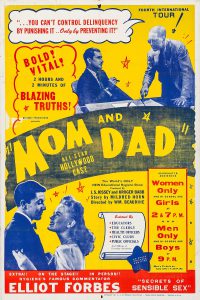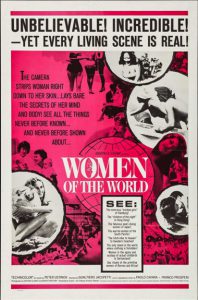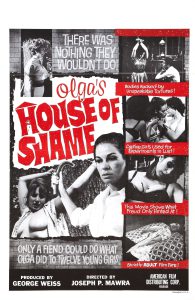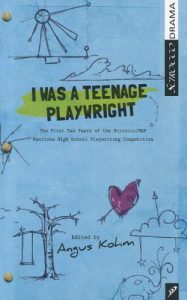Chained Girls (1965) by #JosephPMawra
w/ #JuneRoberts #MarleneEck #MarleneStarr
& narrated by #JoelHolt"Unnatural love of women for women! A daring film about lesbianism today!"#Exploitation #Sexploitation #Documentary ?!#NotQuiteClassicCinema pic.twitter.com/0OVvj9ooFV
— Angus Kohm (@AngusKohm) April 17, 2021
Chained Girls is a phrase that has immediate connotations and resonance for me. When I see it on a movie box – or poster – I assume that I am looking at a Women In Prison film (or WIP as some people like to abbreviate it). This is a genre that I have a particular interest in – and connection to – as I once wrote an important essay about it when I was a film student, and subsequently wrote an entire musical play poking fun at it (which was called Bad Girls Jailhouse and was first produced in 1994). That play started me on a long path of writing, producing and directing crazy musicals, which was my main focus for over ten years – but that’s another story.
Chained Girls (1965) is an old exploitation movie that is NOT about women in prison. It is, as stated in its own publicity materials, “A daring film about lesbianism today!” If that wasn’t shocking enough for audiences in 1965, Chained Girls also claimed to be a documentary. That’s right. A documentary, as opposed to a sleazy sexploitation drama that one might typically have seen at certain drive-ins and grindhouses back in the day. Chained Girls wasn’t a cheap exploitation picture, it was EDUCATIONAL, so… uh… back off censors and other rule mongers. We have to show the public what lesbians do so that honest, morally upright people can LEARN something. This movie is good for them, like eating granola. It can help prevent tragedies and poor life choices by showing what happens to people who who’ve made those poor choices.
 I suppose this suggests that Chained Girls is part of that unique exploitation genre, most popular in the 1930s and 40s, which includes infamous movies like Mom and Dad (1945), Marihuana (1936), Child Bride (1943) and She Shoulda Said No! (1949). On the other hand, it was probably influenced by the emergence of mondo movies, like Mondo Cane (1962), Mondo Cane 2 (1963) and La donna nel mondo aka Women of the World (1963). These movies were pseudo documentaries that purported to show shocking but true (and often sleazy) stuff from around the world. Many of them contained footage that was “fake”, or at least explained as being something other than what it was. For example, a film could show footage of a bunch of
I suppose this suggests that Chained Girls is part of that unique exploitation genre, most popular in the 1930s and 40s, which includes infamous movies like Mom and Dad (1945), Marihuana (1936), Child Bride (1943) and She Shoulda Said No! (1949). On the other hand, it was probably influenced by the emergence of mondo movies, like Mondo Cane (1962), Mondo Cane 2 (1963) and La donna nel mondo aka Women of the World (1963). These movies were pseudo documentaries that purported to show shocking but true (and often sleazy) stuff from around the world. Many of them contained footage that was “fake”, or at least explained as being something other than what it was. For example, a film could show footage of a bunch of  men standing around in a foreign country while the narrator says “These men are here to buy female slaves…”. I suppose it could be true, but there is no actual evidence of slave-buying visible in the footage.
men standing around in a foreign country while the narrator says “These men are here to buy female slaves…”. I suppose it could be true, but there is no actual evidence of slave-buying visible in the footage.
Chained Girls uses this technique often throughout its scant 65 minute running time. One of my Twitter friends (hello Peter) pointed out this questionable gem uttered by the film’s narrator: “Most teenage lesbians are prostitutes or drug addicts.” As I recall, we are simply looking at shots of young women interacting when the narrator says this. I could be wrong, as this movie (despite its claims of being a documentary) is a full production featuring actors who appeared in other exploitation pictures. I don’t think that it contains any  actual “documentary” footage of people living their own lives. Having said that, there might be stolen shots of real people on the streets of the city. But the “scenes” that we witness throughout the film are all staged.
actual “documentary” footage of people living their own lives. Having said that, there might be stolen shots of real people on the streets of the city. But the “scenes” that we witness throughout the film are all staged.
The movie was directed by Joseph P. Mawra, who is best known for his Olga films, such as Olga’s House of Shame (1964), Olga’s Girls (1964), and White Slaves of Chinatown (1964). 1964 was a very busy year for Mawra. As I recall, all of these movies use the same stylistic approach (silent footage of women doing stuff while a narrator says lurid things – and the narrator is often the same guy, Joel Holt, who also acted in and directed a few films as well). Both Mawra and Holt seem to have played out their entire filmmaking careers in the 1960s. Perhaps the arrival of hardcore sex films in the 1970s put them out of business. Who knows?
Chained Girls (1965) is not for everyone, but for those with a taste for its unique brand of antique sleaze, it’s pretty darn entertaining. For those with a sensitivity to out of date, inappropriate and offensive material, it would likely be much less fun. On the one hand, it’s a “documentary” with a lot of misinformation & stereotyping in it. But on the other hand, I kind of believe them when they say they got their facts from recent (in 1965) research. Probably some biased, 2nd rate studies by would-be Masters & Johnson types. This makes it a fascinating window into the crazy beliefs of the time. And it’s the over-the-top inappropriateness of what the narrator is saying that makes the movie a jaw dropping good time (for those who can stand it). John Waters is apparently a fan of this film, and I can see why. In some ways, it’s kind of a distant relative (and perhaps an influence on) Waters’ A Dirty Shame (2004). it’s been a while since I saw that movie, but I recall Waters educating the audience about different types of unusual sexual practices (a plate job, for instance). I really need to see that movie again soon…
One reviewer on the IMDb says “For what it is “chained girls” is one of the best cinematic experiences I’ve ever had… Rarely has a movie made me laugh so hard and so deeply… Really this film is a treat if you are in the right frame of mind and/or watching it with someone who truly has a firm grasp of irony.”
I first saw Chained Girls with my friend Brian during one of our all day movie marathons. We had no idea what we were getting into, and I think we both spent the entire 65 minutes with our jaws hanging open in disbelief (when we weren’t laughing, of course). Watching it again now only confirmed our original impression of it. I remember turning to Brian halfway through the film and saying “This movie could be turned into a brilliant fringe musical.” As I mentioned earlier, I spent many years working on crazy musicals and I had a pretty good eye for material that was ripe for adaptation. “I don’t think I could do it, however,” I said. “The playwright and/or composer needs to be a woman – and preferably a lesbian.” I made a mental note to mention this idea the next time I ran into the right person, but alas, it never came up. So, if any of my lesbian playwright friends are reading this, here’s an idea for you…
As for the rest of us, we can still enjoy Chained Girls (1965), for what it is, on any #FridayNightAtTheHomeDriveIn on which the spirit moves us, grabs us, or otherwise chains us to our seat. It’s the kind of #NotQuiteClassicCinema that must be seen to be believed.

